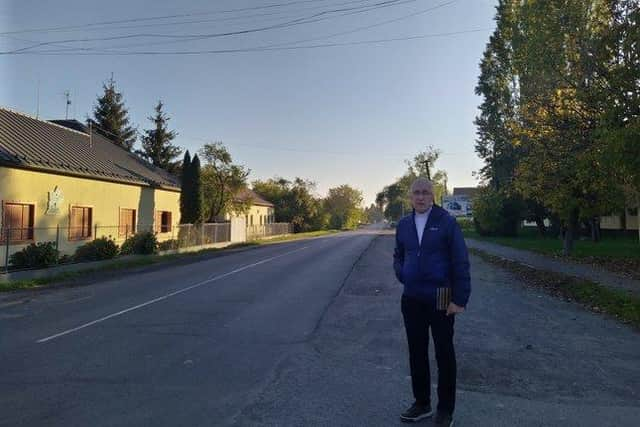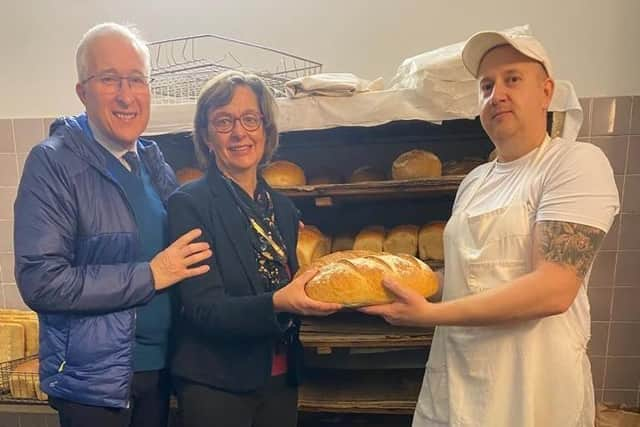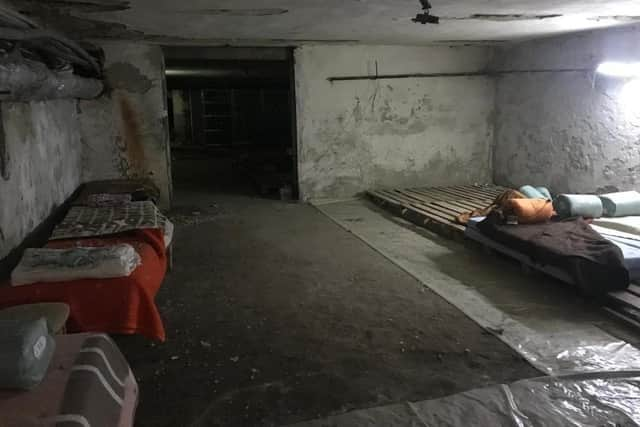Moderator reflects on his visit to Hungary and Ukraine
and live on Freeview channel 276
The appeal, set up by former Moderator Very Reverend Dr David Bruce raised £1.3 million. His successor, Right Reverend Dr John Kirkpatrick, and his wife Joan, were in central Europe last week to see first-hand the work of those supporting the humanitarian crisis in Hungary and Internally Displaced People in western Ukraine.
On their five day visit, the Moderator and Mrs Kirkpatrick saw how that support was being used by PCI’s partner church, the Reformed Church in Hungary (RCH).
Advertisement
Advertisement
They also crossed the border into Transcarpathia, in western Ukraine and the city of Berehove, spending time with the leadership of the Reformed Church in Transcarpathia (RCT) and members on the ground, who continue to care for the thousands of Internally Displaced People fleeing the conflict.


Portrush man Dr Kirkpatrick said: "In Berehove, in western Ukraine where we stayed, even though it is 800 kilometres east of Kyiv, the community has witnessed a double exodus that the Church had to deal with overnight. Firstly an exodus of their own community with people being called up to fight, while others crossed the border into Hungary leaving only the elderly, young mothers and their children and fewer staff in schools and hospitals.
“While ministers and their families have stayed to help, in some cases congregations lost over a third of their members. Transcarpathia then experienced a second exodus of 500,000 people coming from the rest of Ukraine to escape the conflict, with fewer people and little resources to look after them.”
Dr Kirkpatrick continued: “The reality of that is there are empty houses as you go through the villages. You are also very conscious of the distinct lack of men. The air raid sirens are a regular reminder of the war, with the children we met in the schools having to go down to their shelter. While the city wasn’t under attack the sirens sounded as missiles, drones, or shells fell on other towns and cities, perhaps hundreds of kilometres away. It was a very sobering experience and created a constant sense of anxiety for the children. As one soldier told me at a checkpoint, it is a constant reminder for him that people are dying in other parts of the country.”
Advertisement
Advertisement
During their stay, the Moderator and Mrs Kirkpatrick visited congregations, educational and other social welfare institutions run by the RCT, meeting with Bishop Sándor Zán-Fábián, the Presiding Bishop of the Reformed Church in Transcarpathia and its Lay President Béla Nagy, the Director of the RCT’s Diaconal Co-ordination Centre in Berehove.


“During our time together we had an opportunity to talk and pray. Bishop Sándor and Mr Nagy continually reaffirmed how much they deeply appreciated the kindness and generosity of Irish Presbyterians and wanted the Church to know how thankful they were for the support PCI had shown, which has made a massive difference. While aiding the humanitarian effort, that provision has also made a real difference in the provision of practical support for local ministry, which we saw, enabling ministers and their parishes to look after those who have not been able to leave and those who have fled the war,” Dr Kirkpatrick said.
Mrs Kirkpatrick said that while the kindness and warmth of the welcome shown to those fleeing the war, especially by the women who were also so resilient, the pain etched on the faces of those who had fled was plain to see. “We met a lady and her young grandson who had travelled all the way from Donetsk in the east of the country. They had returned home and then escaped again. They couldn’t speak, the pain was literally unspeakable as they couldn’t communicate. We just held each other.”
The Moderator and Mrs Kirkpatrick met the bakers who earlier in the conflict baked 1,000 loaves a day. The bread was put in buses and sent to Kyiv and other parts of Ukraine returning with children escaping the worst of the war, to be looked after by the Church. Hundreds of loaves are still baked each day and distributed to refugees. The Diaconal Centre also sends out weekly humanitarian shipments with in-kind donations to the interior parts of the country, with the church looking after around 5,000 people in its various institutions.
Advertisement
Advertisement
While the Moderator and Mrs Kirkpatrick were in Transcarpathia for a day and a night, the majority of the visit took place in and around the Hungarian capital, Budapest. Here they visited Hungarian Reformed Church Aid headquarters and met its CEO along with the head of its Refugee Ministry, and others, who co-ordinate the humanitarian response. They also visited the RCH’s Mission Service and its theological college.


“In Ukraine and in Hungary we have been shown such kindness and hospitality, even in the midst of such suffering and human tragedy. We listened and tried to encourage, while getting a sense of how the Church has responded and continues to respond to this war,” Dr Kirkpatrick said.
“We have also learnt never to underestimate the power of simply being present. Even at home, when you visit a friend in hospital, or call in on a neighbour who is having a hard time, the fact that you have made the effort can be powerful. As we stood in solidarity with our brothers and sisters in Christ, we certainly found that here.
“While we saw how our Church had contributed to the humanitarian effort, we also saw how the Lord was keeping people at peace. The peace of God that the Apostle Paul writes about in Philippians, the peace that transcends understanding. Just as they were praying, we were asked to pray for a just peace, not victory, but a just peace, seen through Gospel eyes, a peace for everyone.”